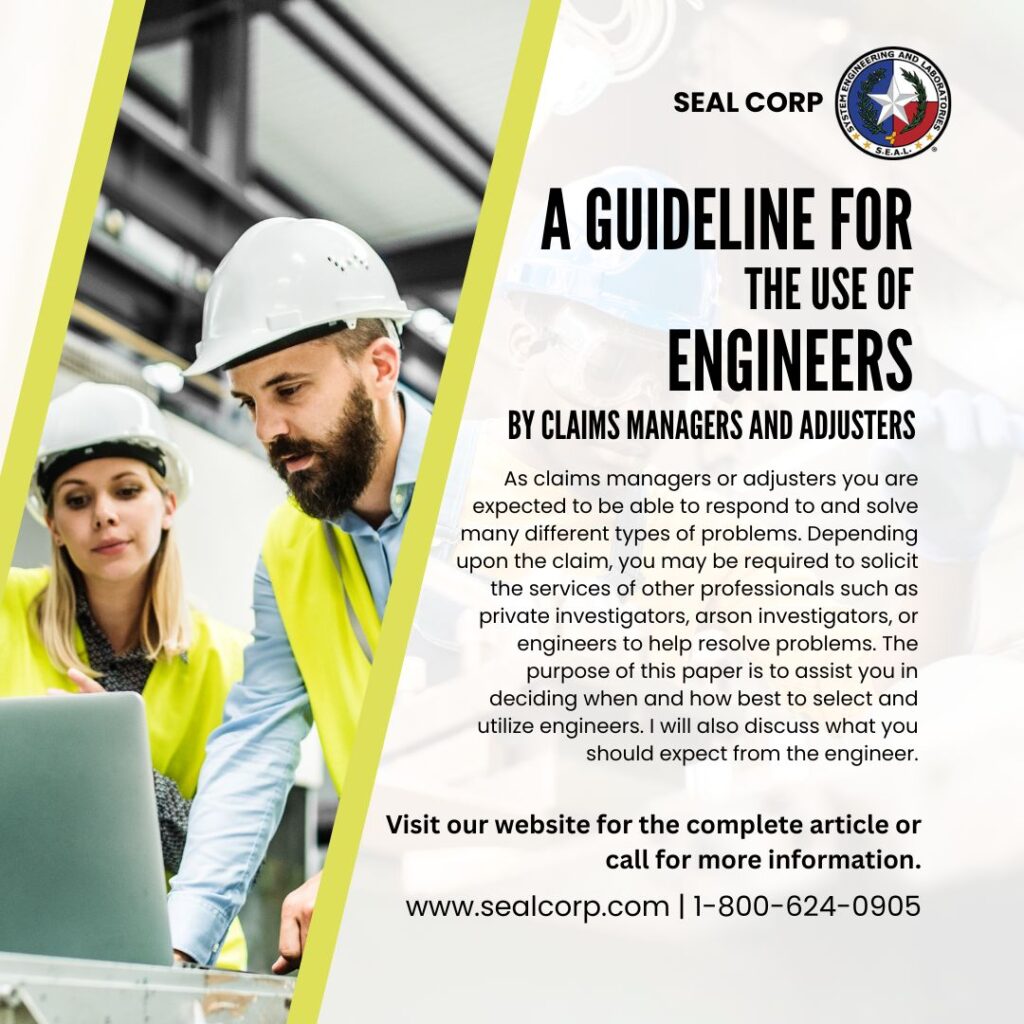Knowledge you need. Experience you want.

Note: Click each tab for the next page.
1 >>>
2 >>>
3 >>>
4 >>>
5 >>>
6 >>>
7 >>>
1 >>>
A GUIDELINE FOR THE USE
OF ENGINEERS BY
CLAIMS MANAGERS AND ADJUSTERS
I. INTRODUCTION
As claims managers or adjusters you are
expected to be able to respond to and solve many different types of problems.
Depending upon the claim, you may be required to solicit the services of other
professionals such as private investigators, arson investigators, or engineers
to
help resolve problems. The purpose of this paper is to assist you in deciding
when and how best to select and utilize engineers. I will also discuss what you
should expect from the engineer, including cost.
2 >>>
II. WHY YOU SHOULD USE AN ENGINEER
Engineering is designated and officially referred to as one of the “learned professions” as is law and medicine. Additionally, engineers are bound by a strict code of ethics in their fields of practice. Because of this, society and, in particular, our court system recognizes and respects the engineer as an individual who can render opinions on technical issues.
Because of that recognition, and, of course depending upon the condition of the loss, an engineer can be of benefit on a particular claim as follows:
A. The engineer can provide a “different viewpoint”-a viewpoint which can be of very significant importance. Not only does the engineer
view things from a technical perspective, but his experience with other problems may also be very valuable.
B. The engineer is particularly well-suited to “independently establish elements of facts.” This may be achieved by investigation at the
scene of the accident from photos and other evidence provided to the engineer or by laboratory tests conducted by the engineer. Establishing
facts is one of the most important reasons to use and engineer.
C. The engineer can “develop” and present “opinions.” From facts and in some situations even hearsay evidence, the engineer can form
opinions which carry substantial weight either in court or in the settlement of a claim. Often, confrontations with a claimant
can be avoided if an engineer is used in the area or issue of a potential dispute.
D. The engineer can ”testify.” An engineer can almost always be qualified as an expert witness to testify in court. Just be sure the engineer
that you use is “willing” to testify.
E. “Economics”. Obviously, economics is a consideration. You need to determine if you should pay the claim, deny the loss, or subrogate. The
engineer’s actions can assist you in making these decisions and can help protect your company’s future economic position on a particular claim.
3 >>>
Ill. WHEN YOU SHOULD USE AN ENGINEER
Obviously, your company policy may dictate or restrict the use of outside professionals, including engineers. Some insurance companies have monetary ceilings at which point an engineer is called in. In many cases it is left up to individual adjusters (perhaps with supervisor approval) to decide at what point to ask for engineering. In any event, the larger the loss the more important advice from an engineer becomes. Generally, losses under a certain amount are not investigated by engineers.
Besides the “dollar value” of the loss, there must be a “technical issue needing to be resolved or better defined. Consideration of the situation can assist in deciding when to or when not to use an engineer.
A. STORMS (Winds, tornado, ice or snow)
Most frequently the above conditions result in engineering questions regarding a buildings structure – in other words, a damage assessment.
However, damage validation may be necessary, that is determining if the storm did the damage of if the damage existed before the storm.
B. FIRE
1. Arson: In fire loss cases where arson is suspected, it is essential that trained fire cause and origin experts investigate the loss and
associated factors such as motive. This is “not” a task for the engineer but should be accomplished by experienced and trained
investigators in the field of fire investigation. However, following the fire investigator’s initial on-scene examination, the services of an
engineer may need to be enlisted for one or more of the following reasons:
a. Arson is clearly indicated by positive samples and other methods. In this case, an engineer can eliminate other possible fire causes
that involve equipment or appliances of a technical nature-gas and electrical systems, for example. Testimony by a registered engineer
eliminating other possible sources could make or break an arson case.
b. Arson is found not to be a cause. The fire investigator may be able to determine the origin or approximate origin but not the exact
cause. In this case, the on-scene assistance of an engineer is needed. It is possible for the investigator to send suspected equipment and
photographs to the engineer’s lab for examination; however, the on-scene examination is much more preferable.
c. Chemical or metallurgical testing is necessary. The engineer may have the capability to do these tests within his organization, or he
should certainly be capable of seeing that the correct tests are conducted at some other lab.
2. Accidental: If the fire is clearly accidental, there will still be a cause. If it is clearly not the fault of the insured, some other party may
have caused the fire, and further investigation should be initiated. Examples of other parties that may have caused the fire are electrical
contractors, manufactures, general contractors, and repairmen. Even in cases that may appear at first to be acts of God, such as those
involving lightning, you should consider if some action of another party made a lightning strike more probable or more severe.
3. Assessment: Obviously, fire damage assessment may be necessary, particularly on metal frame buildings, to determine the amount of
damage to and safety of the building. This can be very important in determining the size of the loss as well as providing an official record
of the damage. Sometimes, claims are made later for more damage than actually occurred.
4 >>>
C. VEHICLE
1. Fire: An automobile fire is a very difficult problem because of the extensive damage that usually results. However, in many cases it is
possible to locate the cause even When the failure was within the fuel system. Engineering consulting in the case of auto fires should be
limited, because the loss is usually small. An engineer need not be involved in those cases where arson is strongly suspected.
2. Collisions: Depending on their severity and magnitude, most collisions certainly involve an engineer at the earliest possible date. An
engineer skilled in the mechanics of vehicle collisions and auto reconstruction can estimate vehicle velocities from skid marks, distances
thrown or skidded from impact, and other data. He can tell if a headlight, brake light, or turn light was on or off at time of impact.
Depending upon the validity of the data, it is also possible to reconstruct the events prior to the accident. This work can sometimes be very costly,
involving on-scene measurements, numerous calculations, and sometimes special on-scene or laboratory testing.
D. STRUCTURAL
Besides the structural damages resulting from storms or fire, all kinds of structural or foundation problems can develop from poor
construction or design. Poor construction can also cause settling and slab problems if geotechnical investigation was inadequate or not
conducted at all prior to building. Structural problems can and do include residential, commercial, civil, marine, space and aviation
structures. Structural failures are often a result of poor design or construction, although a minor force may have precipitated the failure.
Unfortunately, when policies are written, design or construction problems often exist at that time.
5 >>>
E. OTHER DAMAGES
This category covers all those other things that happen including unplanned events or accidents. Perhaps an example listing is appropriate with the understanding that some of the following could be included in one or more of the categories discussed previously.
The following list of accidents, while not all-inclusive, points out instances when the use of an engineer should be considered:
1. Material handling, dropped equipment, broken or failure of lifting equipment.
2. Failed equipment allowing other damage.
3. Explosions.
4. Oil field accidents
5. Aircraft
6. Bridges
7. Failed components.
F. PERSONAL INJURY
Accidents that involve personal injury are a special category. The property damage in such cases may be small or large. In fact, many times the property damage can be zero and still involve and injury or fatality. Personal injury accidents also involve relatives and very often attorneys. Personal injury accidents can involve various theories of law such as workman’s compensation law, product liability, implied or express warranty, rescue doctrine, negligence, gross negligence, and others. These laws vary from state to state. For the workman’s compensation carrier, it is often advantageous to work together, through local counsel with the injured party’s attorney. There are several advantages to this approach: the plaintiff’s attorney shared some of the engineering expenses; the carrier stays informed as to the status of the case; and a clear measure of protection is afforded by staying closely associated with the plaintiff. There are many other fine points to consider for any given situation, and local counsel should be consulted on each case.
6 >>>
IV. WHAT TO EXPECT FROM THE ENGINEER
A. If the engineer is a full-time independent or forensic engineer, expect prompt service (same day or next day if the problem is urgent). If the engineer is a part-time forensic engineer, such as university professors, do not expect fast response every time.
B. Expect a verbal report and cost estimate after his initial visit. Expect him to recommend other specialists, as necessary.
C. Expect some kind of report in ten days or less. If additional work is needed, this may take the form of a verbal report or a status report. If no additional work is required, expect a final report in ten days or less.
D. Expect quality professional work. Above all, the report should be understandable. If you have questions, ask the engineer to supplement his report. He may have used terms or language not understandable to everyone. Don’t hesitate to send the report back and ask that it be redone.
E. Provide feedback to the engineer. If his work is good, let him know about it and handle his invoice promptly. Likewise, let him know about any problems.
F. Expect the engineer to alert you on subrogation or other legal possibilities. The forensic engineer is not a lawyer, but he is exposed to more technical cases than most attorneys are. In this respect, you should expect him to alert you on legal matters for your consideration.
7 >>>
PREPARED BY:
FRANKLIN H. JOHNSON, CSP, P.E.
PRESIDENT, SEAL CORPORATION
SECOND EDITION, 2024
COPYRIGHT 1984 by SYSTEM ENGINEERING AND LABORATORIEES, CORP.
TYLER, TEXAS 75707
All rights reserved. No part of this document may be reproduced in any form or by any
electronic or mechanical means, including photocopying, recording, or by and information storage
and retrieval system, without permission in writing from the author.
Article by:
FRANKLIN
H. JOHNSON, CSP, P.E.
PRESIDENT,
SEAL CORPORATION
TESTIMONIALS
We appreciate what our clients say about us, while respecting their privacy!
The above case has settled. Enclosed is a check for the outstanding balance for your services. Thank you for your services in this matter. I will gladly provide a reference for you to other lawyers and will contact you first the next time I need to retain an engineer.
Attorney at Law
GOOD NEWS! Case settled today at mediation. Please forward invoice for services rendered. We really appreciate your help in this matter and with your assistance we were able to settle for a reasonable amount
Legal Assistant
Dear Mr. Johnson
I appreciate you as well as Mr. Gary Jackson from your office taking the time to inspect the accident site with me yesterday. Your professional assistance in this unfortunate matter remains truly appreciated.
Attorney at Law
I want to let you know how much I appreciated your prompt response after the crane accident. Your assistance and services were invaluable. You provided me with calming perspective during a very difficult time. I hope that I can call on you again if I ever find myself in a similar unfortunate situation. I will certainly recommend you and your company to others.
VP, Crane & Wrecker Service
Brian and Kurt:
We wanted to let you both know that the case settled this week. Your work was instrumental in moving the case to resolution and we appreciate your assistance in getting here. We look forward to working with you in the future.
Attorney at Law
I met with Mr. Gary Jackson and Mr. Greig Latham today, and I appreciate you guys making it out this quickly, I was very impressed.
Business Owner/CEO
I just wanted to say thank you for appearing as an expert witness of the trial. Your testimony was very helpful.
FYI – the jury brought back a plaintiff’s verdict for $3.8 million. Huge win.
FYI – the jury brought back a plaintiff’s verdict for $3.8 million. Huge win.
Attorney at LawCEO
I wanted to let you know that I was able to review my claim with a **** supervisor this morning, and he ruled the decision in my favor. The deciding factor that convinced him to overrule company policy (requiring their own inspection of the physical evidence)
was your report. I can't tell you how grateful I am for your work.
Private Client

